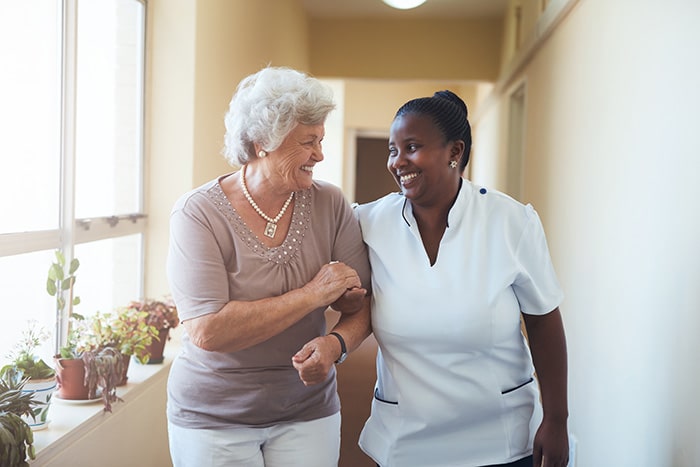Reduce the risk of your loved one falling | Fall Prevention
Falls are the leading cause of injuries for older adults, leading to sometimes catastrophic life changes. The risk of falling rises with age and more than one in three people aged 65 years old or older falls each year. As we age, physical changes, health conditions, and the medications used to treat those conditions, can make falls more likely. The accompanying fear and uncertainty leads to a collateral harm, where many older adults avoid necessary activities.
However, fear of falling should not take over your loved one’s life as there are many precautions you can take to avoid falls. Taking the necessary steps can help prevent the risk of your family member falling and suffering injuries.
Causes of falls
According to NHS inform, the following are risk factors for falls:
- Medication. The side effects of certain medications can lead to dizziness and confusion, as well as affect your thinking. The more medications you take, the higher the risk you have of falling.
- Hazards around the home. Broken steps, lack of lighting, and tripping hazards can increase the likelihood of a fall.
- Painful feet or shoes. Unsafe footwear such as heels and foot problems that cause pain put you at risk for falling.
- Difficulty seeing. Not being able to see clearly causes falls, as does poor visibility at night, which affects even those with unimpaired eyesight.
- Dementia. The state of confusion caused by dementia causes those to be unsure of their environment and therefore puts them at higher danger of falling.
- Weakness. Muscle weakness, especially in the lower body, can cause falls. Additionally, osteoporosis causes low bone mass and an increase in fracture risk.
- Alcohol consumption. Alcohol has a greater impact on blood alcohol levels as people age and puts them at a greater risk for hip fractures.
- Loss of blood pressure. Blood pressure significantly dropping as older adults move from sitting to standing is called postural hypertension and can cause falls.
Consequences with falls
Fall can have devastating impacts on the lives of the elderly and the people who love and care for them. As we age, falling has harsher consequences since our ability to heal deteriorates, general resiliency becomes more of a challenge, and our anatomy has a higher chance of weakening.
In addition, the psychological side-effects can be debilitating on their own, as fear and uncertainty — double psychological burdens that too-often haunt the elderly — can further reduce independence and everyday mobility. Fear of falling, without actual injury, can by itself have a severe impact on an individual. It causes them to avoid situations that appear dangerous, which limits them from maintaining healthy habits such as exercising and leaving the house.
Consequences include:
- Fractured bones
- Broken bones
- Head injury
- Wounds such as scrapes and sores
- The aforementioned fear of falling
Lifestyle changes to prevent falls
Adopting healthy habits and making certain lifestyle changes can help one avoid the risks of falling. National Institute of Aging suggests the following tips for fall prevention:
- Staying active
- Exercise helps build muscle strength and improve flexibility which can help make falls preventable. Having your loved one engage in exercise regularly, in a manner that is accommodating to their physical condition, can allow them to strengthen their body.
- Maintaining a healthy diet and staying hydrated
- Eating the right foods with plenty of vitamin D and calcium can help you maintain healthy bones. Healthy bones are crucial to helping prevent even worse consequences from falls. Drinking plenty of fluids as well is essential because it can prevent dehydration which causes dizziness and weakness.
- Limiting alcohol consumption and quit smoking
- Alcohol affects your balance and reflexes, and its impact increases with age. Limiting alcohol consumption can help; prevent your loved one from being in an unsafe situation. Smoking causes bones to lose mass more rapidly. So, avoiding smoking can also help your loved one protect themselves from falling due to weak bones.
- Getting enough sleep
- Sleep deprivation increases the chance of falling. Getting enough sleep will help you have decent alertness and performance.
Safety/health measures to prevent falls
Mayo Clinic provided some examples of safety and health precautions that your loved one can take for fall prevention:
- See a doctor
- Going to see a doctor can help address your concerns about falling. You can ask questions about your medication as well as about any health conditions that could impact the likelihood of falling. Ask about osteoporosis, vitamin D supplementation, and leg strength evaluations. Getting a routine check-up and making sure your vision and hearing are in check as well can help avoid falls.
- Limit safety hazards
- Clear tripping hazards such as objects and rugs on the floor could cause your loved one to fall. Difficulty seeing is also a cause for falling so adequate lighting is a safety measure that can help prevent that.
- Get proper shoes
Wear safe, protected shoes instead of loose slippers, stockings, and other unstable shoes. Non-skid shoes that fully support your feet will help your loved one avoid falls.
- Use an assistive device
Your family member may need a cane or walker to assist them in preventing falls. An assistive walking device helps support when they are in an unfamiliar environment or when moving on uneven sidewalks.
The consequences the elderly face from falling are dangerous but preventable. Through understanding and following the listed precautions and safety measures, you can protect your loved one from falling and facing the risk of long-lasting injuries.
1 +1 Cares is a referral agency that works for clients and caregivers. We match caregivers with clients and inform them of your requirements. We work for you so you and your loved one can have a safe, enjoyable caregiving experience.



